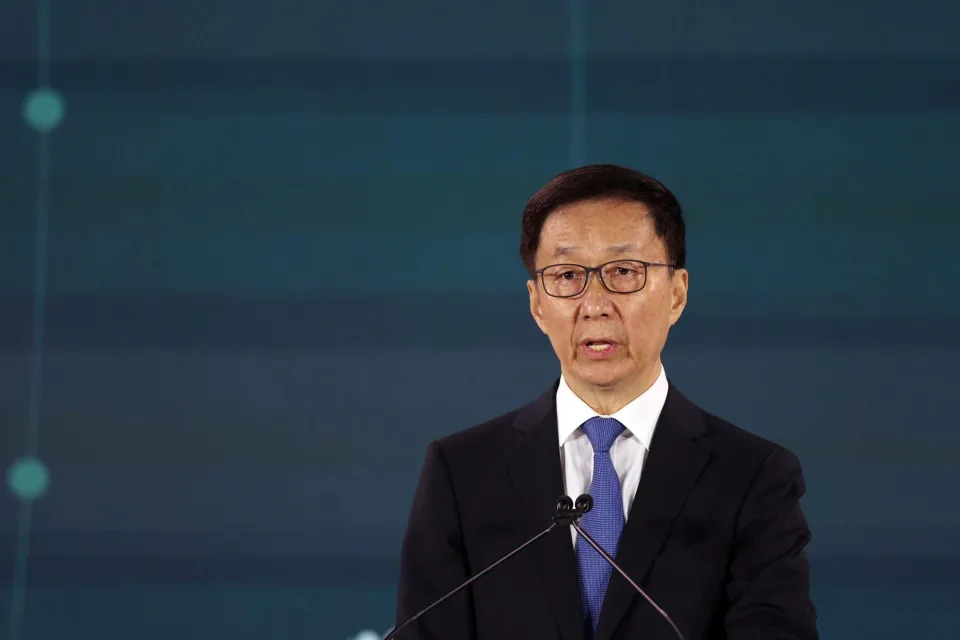China flags readiness to work with US 'at all levels' ahead of Apec summit

China is ready to strengthen dialogue with the United States "at all levels" to mend their relations and work together on global challenges, Chinese Vice-President Han Zheng said on Wednesday.
Han was speaking just a few days before the Asia-Pacific Economic Cooperation leaders' forum in San Francisco, where US President Joe Biden and his Chinese counterpart Xi Jinping are expected to meet for the first time since Bali a year ago.
Beijing has not yet confirmed Xi's attendance at Apec, but recent months have seen an increase in reciprocal high-level visits between Washington and Beijing - widely seen as laying the groundwork for a bilateral summit.
Addressing the Bloomberg New Economy Forum in Singapore, Han said the recent official interactions had sent out "positive signals" and raised the world's expectations of an "improvement" in China-US relations.
"A stable and sound China-US relationship is the common expectation of people from all sectors in other countries and the international community as a whole," he said.
"We're ready to strengthen communication and dialogue with the United States at all levels to promote mutually beneficial cooperation, properly manage differences and jointly address global challenges."

China's Vice-President Han Zheng addresses the Bloomberg New Economy Forum in Singapore on Wednesday. Photo: Bloomberg alt=China's Vice-President Han Zheng addresses the Bloomberg New Economy Forum in Singapore on Wednesday. Photo: Bloomberg>
Han added that Beijing always views and handles its relations with Washington in accordance with the principles of mutual respect, peaceful coexistence and win-win cooperation.
Han's comments also coincided with Chinese Vice-Premier He Lifeng's visit to the US, which has also been seen as part of the effort to set the stage for Biden-Xi summit at the Apec meeting, which begins on Saturday.
He, China's top economic and financial policy official, will meet US Treasury Secretary Janet Yellen during his five-day trip, amid disagreements over tech curbs and subsidies between the world's two largest economies.
In his speech, Han said unilateralism and protectionism "lead nowhere" and that the issue of security "cannot be overstretched".
"Decoupling, severing industrial and supply chains and the so-called 'de-risking' will all only divide the global economy into many isolated islands," he said, adding that China has always been a supporter of economic globalisation.
Han said the country is committed to advancing institutional opening-up and providing more market and investment opportunities for companies from all over the world. "China's economy has been rebounding and improving on the whole," he added.
According to Han, geopolitical tensions are compounded with the evolving economic landscape and emerging crises of food, energy and debt.
At the same time, the deepening of the new round of technological and industrial transformation has brought new opportunities for sustainable economic growth, he said.
Han affirmed China's commitment to innovations in big data, AI and new energy technologies to upgrade its industrial structure for smarter and greener development.
Han's speech was also made at a time of escalating conflict in the Middle East and Russia's protracted war in Ukraine - another layer in the complicated backdrop to a Xi-Biden summit in California.
"We need to be more determined to resolve conflicts through dialogue and consultation and create a stable international environment that is conducive to development," Han said.
"China is ready to work with the rest of the world to uphold world peace and security."
Saudi Arabia's investment minister Khalid Al-Falih spoke after Han at the forum and said he sees positive signs in the US-China relationship as engagement between the two economic powerhouses increases.
"Pragmatism is surfacing," Al-Falih said, noting that his nation has strong relationships with both countries. "We call for collaboration and coexistence between the world's two economic superpowers and geopolitical powers."
Al-Falih said he believed the two powers will reduce their rhetoric about a natural strategic competition and ultimately achieve peaceful coexistence.
- Questions and Answers
- Opinion
- Story/Motivational/Inspiring
- Technology
- Art
- Causes
- Crafts
- Dance
- Drinks
- Film/Movie
- Fitness
- Food
- Juegos
- Gardening
- Health
- Home
- Literature
- Music
- Networking
- Other
- Party
- Religion
- Shopping
- Sports
- Theater
- Wellness
- News
- Culture
- War machines and policy

